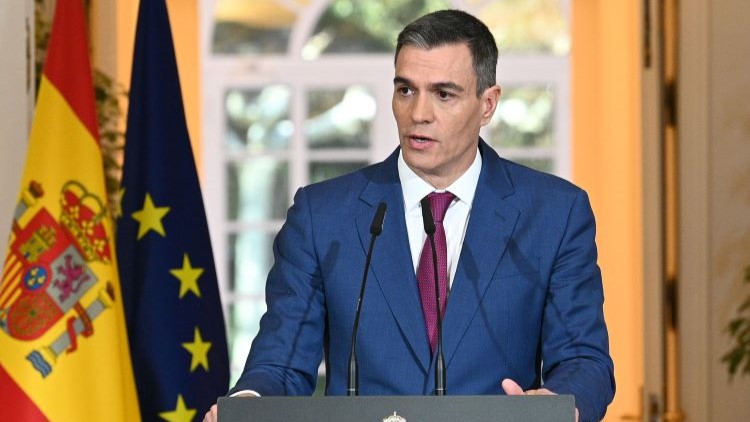Aquí Europa
The director of Canal Europa and Aquí Europa, Jesús González, interviews Adrián Vázquez, Secretary General of Ciudadanos, MEP for Renew Europe and President of the Justice Committee in the European Parliament.
The idea is to assess what has been the year 2023, from the point of view of European policy, that would be the first question. What has 2023 been like after a few years in which we came from the pandemic, then we had the war in Ukraine. It’s not that it has been a normal year, but what is your assessment of the European Union’s political activity?
It has been a more normal year than previous years, because previous years have been so different that it is difficult to follow that trend, but I believe that it has been a year in which many of the decisions that have been taken at times of maximum tension, such as the pandemic or the nuclear war, have taken hold. And this is also a good thing, because I believe that for the first time in our history, which is a very short history of the European Union, the institutions have realised the capacity we have to change things, the capacity we have to respond to major crises if we do so in a united manner and the influence we have in the world, because we can also see it at the regulatory level. We are now closing the big regulatory packages like artificial intelligence, the Green Deal, and we are basically showing the way to the rest of the world in regulation and how we have to deal with these issues.
I think it has been a good year in that sense, but it has also been a bad year in other respects, because unfortunately we have also had a new conflict very close to our borders, that of Israel and Gaza, following that regrettable terrorist attack by Gaza and a response that is beginning to be disproportionate on the part of Israel.
We have had a bad year with regard to the rule of law, the good news is that in Poland there is going to be a change of government, a government of conservatives and liberals, of popular and liberal, is going to kick out an authoritarian government that was undermining the rule of law, which already had numerous infringement proceedings open in Luxembourg and that is the good news, the bad news is that now Spain is taking that place with this law of impunity and in some way is taking the baton from an authoritarian government like the Polish one and is starting to do things that contravene European legislation and the treaties. So, I think that this is a bit of a short balance that I see appearing.
Later we will also talk about the amnesty law or the amnesty project, but first I would like to ask you about the milestones from the point of view of the European Parliament, that is, what has been approved by the co-legislator, because the European Parliament is co-legislator with the Commission. What would you highlight as the major legislative milestones or activity of the European Parliament this year?
There are many, the most concrete I would say is the new regulation on artificial intelligence, I think it is key. Something so unknown and at the same time so necessary to put certain limits on what we have been seeing in recent months as soon as possible and this is going to be something that will go down in history.
We have also made enormous progress on the migration and asylum pact. We have closed four of the seven that are still open, the three most important ones remain. Then there are also the major dossiers relating to the Green Pact, such as life-saving measures and reforestation. There are major legislative elements there that are also going to set the pace for the rest of the world in terms of how to protect the environment and also human rights, so that we are not going to fool ourselves in good practice, let’s say, both business and individual, as well as the governments of, not just the European Union, because this is going to affect half the world.
I will tell you, these are the milestones, there is one thing we are missing, which I think is important, which is to reach an agreement on fiscal rules. I believe that the times of crisis have passed, I believe that we are already moving in the direction of Ukraine’s accession to the European Union, it is going to be very difficult to achieve, but I believe that important foundations have already been laid to do so, but we still need to re-establish the fiscal rules. This coffee-for-all thing has to stop now, because if there are not governments that are very responsible, the Spanish government is the first one that is going to leave young generations in debt, as we are already in debt for the rest of the decades to come. So, the sooner the fiscal rules are redefined and limits are put on the deficit and national debt, the better.
2023 brought us the fifth rotating Spanish Presidency of the European Union, which was opened by a decision of the President of the Government, with a general election, and that has greatly conditioned the agenda of the Presidency, but I would also ask you to assess how you have seen the Spanish Presidency of the Union.
Well, it could have been the great presidency, because this is really the last viable legislative semester of the legislature, with dossiers like the ones I have mentioned, which are very important to close, it must be said that above all the diplomatic team of the Spanish permanent representation in Brussels has done an excellent job on most of the dossiers, despite the substances, despite the lack of support and despite the sectarianism of the current government. And I say this because I have negotiated many of them and I have experienced it. But it has given me a lot of grief because they have been swimming with only one arm. That is because the Spanish government has dedicated itself to calling early elections, swindling the Spanish citizens, promising one thing and then doing the opposite, it has squandered its political capital in the Council by trying to pay one of the quotas it has to pay to the pro-independence supporters and the game of justice, the issue of languages, which has burst our political capital in the council, has gone to the European Parliament, has thrown 3 cans of petrol at the president and a match, bursting the coalition government, let’s see what effects this has on a possible coalition in 2024.
And last but not least, it has put us at the back of the queue in terms of respect for the rule of law with this law of impunity, which we will see how it ends, it is still a proposal, it is not a law, but the European Commission has already asked for explanations, it has asked the minister for consultations, it has already communicated publicly that there are things that concern it, it has really been a disaster.
Regarding this, the Amnesty bill. You have been very active from the beginning, you are also president from the institutional point of view of the European Parliament, president of the Justice Committee, you have obviously been obliged to make the members of the government who had to go there to give reasons, but then there have also been meetings with Commissioner Reynders. How do you see the possibilities, from the point of view of European attitudes, that this law could be altered by European efforts if it does not comply with part of the Union’s treaty?
It is true that the relationship between the European Commission and the Government is not good, especially with the Minister of Justice Bolaños, it is very, very damaged, because Mr. Bolaños, well, you cannot go to consultations and be called to explain the situation in Spain regarding the relationship between the General Council of the Judiciary, the reform formula and a law that may contravene the European treaties and then say that the Commission is not concerned. What you have done is to break the principle of trust. So that is how it is.
Mr Bolaños, unfortunately, has not wanted to come and give explanations to the Justice Committee. He is the only Minister of Justice in this legislature who, during his rotating presidency, has refused to give explanations to the Justice Committee, which also explains very well the situation of total weakness. And I believe that the Commission is doing what it has to do. Now it is asking for information, making public statements, keeping its eyes and ears open here in Spain to see how it develops and once the bill has passed through the parliamentary procedure we will see what action needs to be taken, but I am warning you that this is going to get old and it is going to end very badly for the Socialist Party.
One last question, which is a topical issue and one that must be put to the Secretary General of Ciudadanos and also a current MEP. There is nothing official, but some media have leaked the possibility that the Popular Party might include the names of citizens, current MEPs or not, but people who are currently active and working in Ciudadanos with a view to the lists for the European elections next June. What is the current position of Ciudadanos?
Well, I am flattered that they see that the work done by Ciudadanos Europeos in Brussels is key, as it has been throughout the legislature and as it must continue to be from June onwards. And our presence in the European liberal group defining majorities on the left and right in this coalition government between the European socialists, the liberals and the people, is not only because we were part of the creation of this group, but also because we are the second most important delegation. So you can see, and Spanish citizens and public opinion can see, that if the Ciudadanos MEPs had not been in the legislature, what would have happened?
So I am flattered, but at the same time I am from where I come from. So I am a liberal, and as Ciudadanos MP I represent European liberal values, we are not conservatives and we are determined that our values and the liberal space will be represented and will again be decisive in the liberal group from June onwards.







